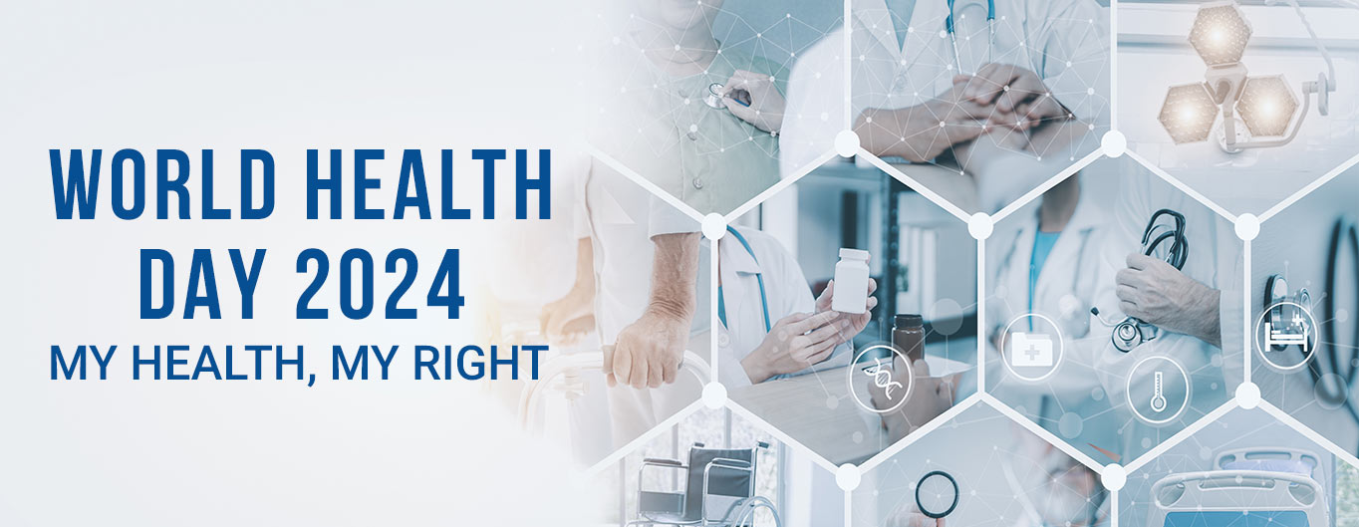
This essay is part of the series: World Health Day 2024: My Health, My Right
Artificial intelligence (AI) is making steady inroads into the health sector, and it could transform global health outcomes over the next decade. As the Organisation for Economic Cooperation and Development (OECD) points out, AI could address some of healthcare’s principal challenges, including dwindling workforces, ageing populations, the growing complexities caused by chronic disease burdens, and emerging threats to public health. With the healthcare industry accounting for US$ 9 trillion, or 11 percent of global GDP, these shifts are likely to have a major economic impact as well.
Around the world, AI and machine learning (ML) are beginning to support medical diagnosis and treatment in various ways. The algorithm-enabled analysis of health data is in some instances leading to more accurate diagnoses, and more focused interventions. Predictive models are also being used—albeit cautiously—to detect patterns, take pre-emptive action, and develop personalised treatment plans. According to a study by the American National Centre for Biotechnology Information, for instance, AI successfully detected 68 percent positive cases of COVID-19 in a dataset of 25 patients otherwise diagnosed as negative cases by healthcare professionals.
The algorithm-enabled analysis of health data is in some instances leading to more accurate diagnoses, and more focused interventions.
As governments and tech firms step up their health-focused AI investments, the global healthcare AI market is expected to touch US$ 188 billion by 2030, growing at a compounded annual growth rate (CAGR) of 37 percent between 2022 and 2030.
The Indian context
In keeping with global trends, the Indian market for AI in healthcare is growing rapidly too and is expected to cross US$ 1.6 billion by 2025, at a CAGR of 40.5 percent from 2020 to 2025. Millions of new jobs are likely to be created in the space. Reports suggest that AI will replace almost 23 percent of existing roles in Indian healthcare by 2028, even as overall hiring in the sector increases by 25 percent with a marked focus on skilled AI solutions developers, data scientists, and other tech professionals.
In many ways, India’s National Strategy for AI (2018) set the tone for current developments by identifying the country’s healthcare sector as “probably the most intuitive and obvious use case primed for intervention by AI-driven solutions”. It earmarked specific areas for AI integration such as early detection, diagnosis, decision-making and treatment, medical research and training, and the augmentation of personnel and lab facilities across India. Efforts are underway to translate much of this into action. For example, the Ayushman Bharat Digital Mission—which aims to make citizens’ health data interoperable within the Indian health ecosystem and develop longitudinal electronic health records for every citizen—is creating multiple data registries so that data silos can be broken, and it is easier to build and integrate AI and ML solutions. AI and ML models are being leveraged to strengthen data collection, the quality of care, and doctor-patient consultations on e-Sanjeevani, India’s national telemedicine platform. Simultaneously, two national Centres of Excellence for Artificial Intelligence have also been set up specifically to promote the development and use of AI-based health solutions.
AI and ML models are being leveraged to strengthen data collection, the quality of care, and doctor-patient consultations on e-Sanjeevani, India’s national telemedicine platform.
Public-private partnerships are actively being explored to help mainstream and accelerate the deployment of AI applications. Since 2018, the NITI Aayog has been working with Microsoft and Forus Health to use AI for the early detection of diabetic retinopathy. The AI algorithm being developed could eventually be used as a screening tool in primary care. Similarly, India’s first de-identified cancer image bank – the Comprehensive Archive of Imaging (CHAVI), developed by the Tata Medical Centre and IIT Kharagpur – allows for oncological images to be utilised by AI tools, thus empowering ML models to identify biomarkers and improve outcomes in cancer research.
The private sector and major private hospitals have also emerged as major AI-for-health actors. Healthtech firms are developing a broad spectrum of AI-powered solutions, from linking individuals to pharmacies to supporting early breast cancer detection. Among other institutions, the Apollo Hospitals chain has created a personalized health check programme called ProHealth that combines inputs from medical experts and AI—by drawing on a data bank of 25 million screening results—to predict health risks, recommend corrective actions, and address lifestyle diseases.
Pitfalls and pathways
Even as India makes impressive strides in adopting AI-based healthcare, challenges such as data access, concerns around data privacy and misuse, and regulatory uncertainties continue to hinder the widespread adoption of AI.
On the whole, fragmented and incomplete datasets tend to plague health-focused AI in India, and could potentially lead to inaccurate or non-representative solutions. A stronger culture of institutional organization, storage and sharing of anonymised health data ought to be fostered to facilitate AI research and development. Datasets could for instance be made available in larger volumes to the country’s research and innovation ecosystem through portals like the India Datasets Programme, the National Data and Analytics Platform, and the Open Government Data Platform. At the same time, the relative lack of standardised data formats and robust data cleaning tools often poses roadblocks to interoperability, along with the sometimes rudimentary nature of health infrastructures in terms of their ability to ensure data security and scalability.
A stronger culture of institutional organization, storage and sharing of anonymised health data ought to be fostered to facilitate AI research and development.
Fears about data security, privacy and confidentiality are the chief stumbling block for assembling large health datasets that could power AI. These fears are not unfounded. In 2022, the Indian healthcare sector was hit by 1.9 million cyber-attacks, which included numerous cases of data breaches and theft. In October 2023, the Indian Council of Medical Research experienced a massive data breach—possibly the largest in Indian history—which resulted in the exposure of the personally identifiable health data of 815 million Indians. Much of this data was then put up for sale on the dark web.
Understandably, stakeholders have expressed reluctance to make health datasets available for AI development. What is crucial is to build capacities to anonymise health data, and provide safe and secure environments in which that data can be used to train AI models. Indeed, there is a great deal to be learned from the system of Confidential Clean Rooms being piloted under the Data Empowerment and Protection Architecture (DEPA) 2.0, where sensitive personal data can be “accessed in an algorithmically controlled manner for model training”.
The Digital Personal Data Protection (DPDP) Act 2023 holds much promise for Indian healthcare, where managing personal data ethically and meeting stringent data protection and privacy norms is of paramount importance. As the implementation of the Act advances, it could produce a more robust regime for collecting, encrypting, storing and processing health data. The need to comply with these standards is likely to result in higher investments in cybersecurity infrastructures, including the capacity building of stakeholders to protect health systems against cyber-attacks. Explicit consent requirements from patients about data collection and use, and greater awareness about what their data is actually being used for, could boost trust across the health ecosystem. Taken together, these elements are likely to catalyse AI innovation, but a fine balance will have to be struck between the stylisation of data to innovate, and the maintenance of patient privacy.
Explicit consent requirements from patients about data collection and use, and greater awareness about what their data is actually being used for, could boost trust across the health ecosystem.
Released in September 2023, the G20 New Delhi Leaders’ Declaration saw heads of state call for a “pro-innovation regulatory or governance approach that maximises the benefits and takes into account the risks associated with the use of AI”. A key AI governance issue that has serious implications for AI in healthcare is who to hold liable or legally accountable if an AI health solution produces adverse outcomes. AI evolves through repeated data ingestion and analysis, and self-learning through error. But in healthcare, any margin of error could have life-threatening consequences. For example, a firestorm ensued when it came to light that IBM Watson Health’s cancer diagnostic tool had not been trained with real patient data, but with a set of hypothetical case studies provided by a clique of doctors in a single hospital. Its recommendations were found to be inaccurate and unsafe.
As Indian hospitals begin to use AI more frequently for diagnostics and predictive analysis, who is to be held responsible if something goes wrong? Given that AI has causal agency without legal agency, is it the AI developer, deployer, or the AI system itself that should be held liable? In practice, it can be difficult to identify the AI “developer” when a solution is shaped collaboratively by multiple developers and deployers before it ultimately reaches the user. Both Indian and international AI governance frameworks and laws will have to resolve the dilemma of whether or not AI should be assigned legal personhood, and how to deal with it if it is.
A key AI governance issue that has serious implications for AI in healthcare is who to hold liable or legally accountable if an AI health solution produces adverse outcomes.
Finally, the skill deficit in the Indian AI development space must be rectified. Currently, an estimated 416,000 people work in the fields of AI and data science, but there is an urgent demand for at least 213,000 more. Indian healthcare in particular is witnessing a surging demand for AI and tech professionals. Even as the government, tech companies, and academia roll out AI skilling programmes, learners must be alerted to the opportunities they can tap. Now is the moment to start building a groundswell of interest in AI for health.
Anirban Sarma is the Deputy Director and Senior Fellow at the Observer Research Foundation
Shrushti Jaybhaye is a Research Intern at the Observer Research Foundation
The views expressed above belong to the author(s). ORF research and analyses now available on Telegram! Click here to access our curated content — blogs, longforms and interviews.




 PREV
PREV



